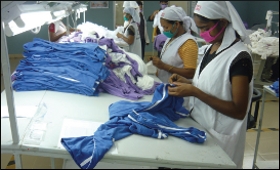|

|
DISHA: A mission to strengthen ethical sourcing for apparel trade in India
|
|

|
|
| Top Stories |
 |
|
|
|
Sameer Pushp | 03 May, 2012
Recognizing the important linkages between ethical trade and economic
growth, the Ministry of Textiles Government of India, asked Apparel
Export Promotion Council (AEPC) to work on the compliance code for
ethical sourcing for the Apparel Exports from India. The Project is
called- Driving Industry towards Sustainable Human capital Advancement
(DISHA). This project is an attempt to educate apparel exporters on a
''code of ethics'' covering all critical areas of social and
environmental concerns.
Under the project DISHA, Rs 2 lakhs would be spent per unit, while
participants would be required to contribute Rs 25,000 each. The
Textiles Ministry has allocated about Rs 6 crore for the first year
(2011-12) of the programme. In the first year, the scheme would cover
400 units in different parts of the country based on a cluster approach.
India's USD 14-billion apparel export sector is critical in terms of
revenue and employment. Therefore, an initiative to help manufacturers
focus on good work practices and prevention of child and
trafficked/forced labour was the need of the hour. The move comes in the
backdrop of the concerns raised by a few western countries like the US
regarding usage of child labor in production of garments by some
domestic units. The US and the European Union together account for 80
per cent of Indiaâs total apparel exports.
With DISHA in progress India is well placed to emerge as one of the most
compliant sourcing destinations amongst the developing nations and this
can be built upon as our biggest value proposition. Under the
programme, the units would be encouraged to adopt improved production
systems and workerâs productivity. The important focus of DISHA is issue
of certification. Dr. A Sakthivel, Chairman AEPC said, âWe want to
involve all certifying agencies. They should all recognize DISHA as a
certifying agency. The certification will ensure global acceptance of
the certified units.â To take the process forward AEPC organized a round
table for the âformation of stakeholders forumâ.
The aim for the formation of âstakeholdersâ forumâ is to integrate
perspectives, voices and concerns as well as seek assistance and
contributions of various stakeholders of the apparel industry towards
developing strategies to improve Indiaâs image as an ethical sourcing
destination. The stakeholdersâ forum addressed the challenges of apparel
exporters and provide time-honored, focused and need based solution/
assistance. This consultation included participants from International
Organizations, NGOs, Trade Unions, Third party accreditation agencies,
multi stakeholder institutions, Brands, Retailers and Buying Houses.
All of them gave relevant inputs during discussion.
The stakeholdersâ round table was chaired by Mr V Srinivas, Jt
Secretary, Ministry of Textiles. Chairman AEPC, Dr. A Sakthivel
addressed the stakeholders. Addressing the meeting Shri Sakthivel said,
âDISHA is an advisory body to help small scale exporters as they need a
lot of guidance and help to grow. I am happy that so many people and
bodies have responded positively to it. It will help in building a
quality consensus and everyone will benefit from it.â The programme
includes issues pertaining child labor, freedom of association, proper
wages, capacity building and much more.
Addressing to the stakeholders Shri V Srinivas, JS in the Ministry of
Textiles said, âI am deeply touched & moved by this initiative. We
are a trade promotion ministry and our mandate is trade promotion. AEPC
is the leading export promotion council and we get lot of export revenue
from their efforts. Answering to the demand on issues of child labour
by the stakeholders, Shri Srinivas said, â6.5 million Inspections of
factories have been done in the past. We are in touch with the Labor
& Employment Ministry and conviction rates against forced child
labor are coming down.â
Representatives from ICRIER, STR, Ethical Trading Initiative, TUV
Rhineland, WRAP, FLO-CERT, SGS, GIZ, ILO,etc participated in the
consultations. As a matter of fact, till date (16th April 2012) 134
units have enrolled for DISHA certification, the letter of Intent
received from 68 Units. Self Assessment Tool (SAT) workshops have been
conducted for the 51 units. Around 40 Qualitative Assessment
Questionnaire (QAQ) filled after one on one interaction with unit
representatives. 48 SATâs have been received so far (16th April 12) from
the enrolled units out of which 31 have been uploaded and 17are under
process of completion.
The vision of DISHA is to embrace best of the standards and practices
suggested through the feedback of stakeholdersâ so that, Indiaâs apparel
trade is on a path of rapid and sustained growth.
* The author is Senior Public Relation officer at AEPC.
* The views expressed by the author in this feature are entirely his own and do not necessarily reflect the views of SME Times.
|
|
|
| |
|
|
|
|
|
|
|
Child Labour Economics
Saurabh Singh | Thu May 3 06:30:02 2012
I appreciate the efforts of Ministry of Textile. BY breaking the backbone of child labor economy we can eliminate child labor. In past famous NGOs like Bachpan Bachao Andolan have undertaken various campaigns to break the backbone of child labor economy which have yielded very good results.

|
|
|
|
|
|
|
| |
| Customs Exchange Rates |
| Currency |
Import |
Export |
US Dollar
|
84.35
|
82.60 |
UK Pound
|
106.35
|
102.90 |
Euro
|
92.50
|
89.35 |
| Japanese
Yen |
55.05 |
53.40 |
| As on 12 Oct, 2024 |
|
|
| Daily Poll |
 |
 |
| Do you think Indian businesses will be negatively affected by Trump's America First Policy? |
|
|
|
|
|
| Commented Stories |
 |
|
|
|
|
|
| |
|